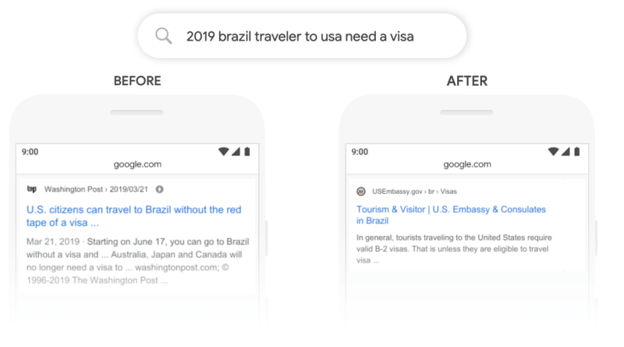November 1, 2019
| Article | by Bari Friedman Eisenberg | Search Engine Optimization
The State of Search: BERT
On October 25, 2019, Google announced the release of its most recent algorithm update, BERT.
What is BERT?
BERT, which stands for Bidirectional Encoder Representations from Transformers, is Google’s neural network-based technique for natural language processing (NLP) pre-training. This technology was first introduced last year and has been used to help computers better understand natural language.
When applied to search, BERT helps better interpret and understand the context of users’ queries in order to provide more relevant search results in Google. At this time, BERT has only been rolled out in the United States, in English, but it will extend to other countries and languages in the future. However, when it comes to populating featured snippets, BERT is being used globally and across all languages.
How BERT Works in Real Life
See the example shared by Google, below. For the query “2019 brazil traveler to usa need a visa”, BERT helps Google understand the role of the word “to” in this particular query:

Prior to BERT, Google would return a news article that references U.S. citizens traveling to Brazil in the top position but after BERT has rolled out, Google returns the Tourism & Visitor page of the U.S. embassy in Brazil site which shares much more relevant information that better matches the searcher’s intent with this query.
Kind of a Big Deal
While not the largest Google update we have seen to date, the BERT update does represent “the biggest leap forward in the past five years, and one of the biggest leaps forward in the history of Search”, according to Google.
What Does this Mean for Us?
BERT will impact 1 in every 10 search queries made in Google, which is significant. Google’s Danny Sullivan reassured the search community that there is nothing we need to change or do differently on our client sites in relation to this update. He went on to say that “There’s nothing to optimize for with BERT, nor anything for anyone to be rethinking. The fundamentals of us seeking to reward great content remain unchanged.”
Based on the way Google explains the functionality of BERT, our search engine optimization team will closely monitor organic traffic, reevaluate the search landscape of our clients’ priority keywords, and focus on better matching site content with the user intent of target keywords. In addition, producing quality content that fully satisfies users’ queries continues to remain top of mind.
Additional Industry News & Useful Links
-
October 14-19: SERPs experienced some volatility during this time which was likely due to Google making tweaks to its September 2019 Core update
-
October 16: Google confirmed that it was having issues indexing new content but fixed this issue by the end of the day.
-
October 25: Google BERT update announced. BERT stands for Bidirectional Encoder Representations from Transformers and is a new way for Google to better understand language and context to improve search results in the US in English (it will come to more countries and languages in the future). Take a look at Google’s blog post for more information on BERT.
-
Google announced that it updated its accessibility guidelines for making site images more accessible. Check out the updated guidelines here.
-
There is new structured data available to appear in Google Assistant searches. The types of content that are supported by this new structured data include podcasts, recipes, news, FAQs, how-to guides, and video. As voice search continues to grow, learn how to build actions from web content here.
-
Danny Sullivan of Google published a series of tweets regarding how journalists need to be better about citing their content by linking to original and supportive sources. Read the tweets here.
-
The FTC recently found high- end beauty brand, Sunday Riley, guilty of publishing fake product reviews written by company employees. When it comes to reviews, authenticity is most important.
-
Great read: Take a look at Lily Ray’s article on E-A-T where she explains E-A-T and shares a number of examples of sites with “stellar E-A-T”.
-
October 29: Google announced that it will stop indexing Flash by the end of this year.
-
Google recently updated their “How Search Works” video. Check out the video here.
-
Google announced that H1 tags are useful but not critical for search rankings. (Note: We still recommend including an H1 tag on important landing pages.)

